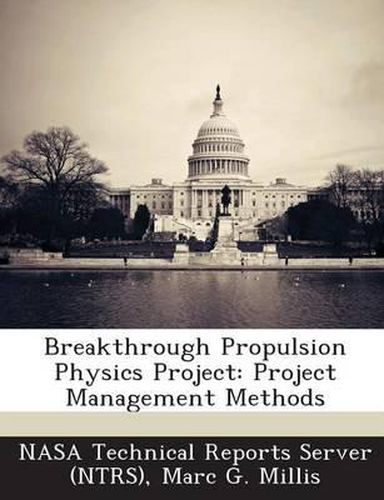Readings Newsletter
Become a Readings Member to make your shopping experience even easier.
Sign in or sign up for free!
You’re not far away from qualifying for FREE standard shipping within Australia
You’ve qualified for FREE standard shipping within Australia
The cart is loading…






To leap past the limitations of existing propulsion, the NASA Breakthrough Propulsion Physics (BPP) Project seeks further advancements in physics from which new propulsion methods can eventually be derived. Three visionary breakthroughs are sought: (1) propulsion that requires no propellant, (2) propulsion that circumvents existing speed limits, and (3) breakthrough methods of energy production to power such devices. Because these propulsion goals are presumably far from fruition, a special emphasis is to identify credible research that will make measurable progress toward these goals in the near-term. The management techniques to address this challenge are presented, with a special emphasis on the process used to review, prioritize, and select research tasks. This selection process includes these key features: (a) research tasks are constrained to only address the immediate unknowns, curious effects or critical issues, (b) reliability of assertions is more important than the implications of the assertions, which includes the practice where the reviewers judge credibility rather than feasibility, and © total scores are obtained by multiplying the criteria scores rather than by adding. Lessons learned and revisions planned are discussed.
$9.00 standard shipping within Australia
FREE standard shipping within Australia for orders over $100.00
Express & International shipping calculated at checkout
To leap past the limitations of existing propulsion, the NASA Breakthrough Propulsion Physics (BPP) Project seeks further advancements in physics from which new propulsion methods can eventually be derived. Three visionary breakthroughs are sought: (1) propulsion that requires no propellant, (2) propulsion that circumvents existing speed limits, and (3) breakthrough methods of energy production to power such devices. Because these propulsion goals are presumably far from fruition, a special emphasis is to identify credible research that will make measurable progress toward these goals in the near-term. The management techniques to address this challenge are presented, with a special emphasis on the process used to review, prioritize, and select research tasks. This selection process includes these key features: (a) research tasks are constrained to only address the immediate unknowns, curious effects or critical issues, (b) reliability of assertions is more important than the implications of the assertions, which includes the practice where the reviewers judge credibility rather than feasibility, and © total scores are obtained by multiplying the criteria scores rather than by adding. Lessons learned and revisions planned are discussed.